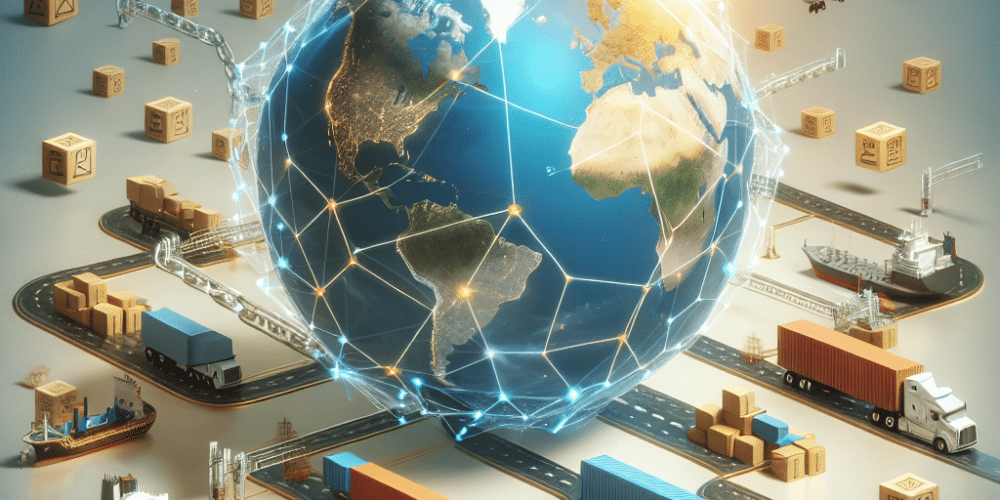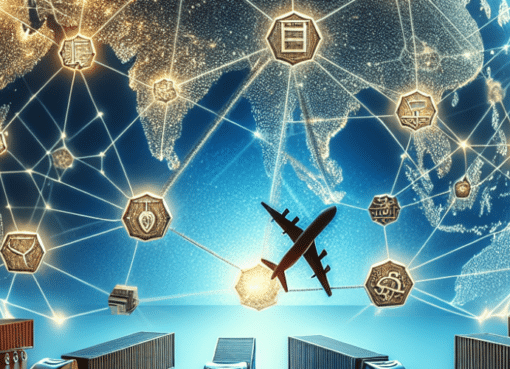In a groundbreaking shift poised to transform international trade, several global logistics companies announced this week a new initiative to incorporate blockchain technologies into their supply chain operations. This move aims to enhance transparency, efficiency, and security across the board, marking a pivotal moment for the industry.
The initiative, spearheaded by leading logistics giants including TransGlobal Logistics and FastTrak Cargo, is designed to harness the decentralized nature of blockchain to facilitate real-time tracking and verification of goods. Using a shared ledger, all parties involved in the supply chain—from manufacturers and shippers to distributors and retailers—will be able to access up-to-date information regarding the whereabouts and status of goods as they move around the globe.
Blockchain technology, originally the backbone for cryptocurrencies like Bitcoin, has increasingly been recognized for its potential to provide secure, transparent, and efficient solutions in various sectors. In supply chain management, its application ensures that every transaction or movement of goods is recorded on a block. Once recorded, the blocks are linked together and encrypted, making the information immutable and readily verifiable by all participants. This prevents fraud, errors, and delays, while also enhancing compliance and trust across the supply chain ecosystem.
“The integration of blockchain technology within our logistic processes will redefine global trade operations,” said Maria Gomez, CEO of TransGlobal Logistics. “Not only will it reduce the time goods spend in transit and customs but it will also give our clients unprecedented visibility and assurance about their products.”
The announcement comes at a crucial time. Amidst increasing global tensions and trade uncertainties, supply chains have faced significant disruptions. The COVID-19 pandemic highlighted the vulnerabilities of traditional supply chain mechanisms, where lack of transparency and coordination led to massive backlogs and shortages. Blockchain’s attributes directly address these issues, offering a more resilient framework for global trade.
Experts predict that blockchain’s role in logistics will result in significant cost savings. By eliminating redundant processes and reducing the need for intermediaries, companies can lower operational costs. Furthermore, the enhanced accuracy and transparency provided by blockchain can significantly reduce the losses associated with counterfeit goods and trade fraud, which cost the global economy billions annually.
According to logistics technology analyst, Tom Richards, “Blockchain could very well be the key to preventing the next major supply chain failure. Its ability to maintain a tamper-proof, real-time ledger of goods is nothing short of revolutionary in our field.”
In addition to the economic and operational efficiencies, the environmental impact of improved supply chain management is also notable. More accurate demand forecasting and inventory management, enabled by real-time data, lead to better allocation of resources and less waste. This streamlined approach not only cuts down on unnecessary shipping and storage but also significantly reduces the carbon footprint associated with these activities.
While the benefits are clear, the transition to a blockchain-based system is not without challenges. Integration concerns, the need for stakeholder buy-in, and technological compatibility issues must be addressed. However, early adopters like TransGlobal Logistics and FastTrak Cargo are optimistic. They have already initiated pilot projects to demonstrate the capabilities and benefits of blockchain, aiming to set a benchmark in the industry.
These pilot projects are being closely watched by other sectors where supply chain integrity is critical, such as pharmaceuticals, luxury goods, and electronics. Success here could trigger a wider adoption of blockchain technologies, leading to a more interconnected and reliable global market.
This week’s announcement marks a significant leap towards a future where blockchain technology could become a standard in logistics and beyond. As companies continue to navigate the complexities of global trade, blockchain stands out as a beacon of innovation, promising a more transparent, efficient, and secure commercial landscape.




